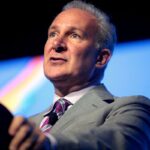Embracing AI could reshape our economy and redefine work as we know it.
- Vinod Khosla predicts AI will lead to significant deflation and lower costs for essential services.
- He believes that expertise in various fields will become nearly free to access due to AI advancements.
- Khosla emphasizes the need for a robust social safety net as automation impacts jobs.
- He forecasts GDP growth could reach 5% over the next 25-50 years, providing resources for social services.
- Khosla acknowledges potential risks of AI but believes they can be managed.
Vinod Khosla, a prominent venture capitalist, asserts that artificial intelligence (AI) will significantly reduce costs across various sectors, including healthcare and education, unless human intervention hinders its potential. In a recent interview, Khosla highlighted that while AI may replace many jobs, it will also create opportunities for a more comprehensive social safety net. He believes that expertise in fields such as engineering, medicine, and education will become nearly free for everyone to access, thanks to AI advancements. nnKhosla, who co-founded Sun Microsystems and has a successful track record in venture capital, predicts that about 80% of tasks in most jobs can be automated, potentially affecting 64% of all jobs. He emphasizes that the key question is whether society will allow this transformation to occur. nnHe envisions a future where AI not only drives down prices but also leads to an abundance of goods and services. Over the next decade, he anticipates that while the political and social landscape may not change drastically, AI will enhance efficiency and productivity. However, as automation impacts a significant portion of the workforce, governments will need to expand social services to support those affected. nnKhosla projects that GDP growth could rise to 5% over the next 25 to 50 years, providing ample resources to address the challenges posed by automation. He argues that if essential services like healthcare and education become more affordable, it will be easier to construct a robust social safety net. nnIn his view, the focus of people’s lives may shift from merely earning a living to seeking meaning, as AI takes over menial tasks. While acknowledging the potential risks associated with AI, Khosla believes that these can be managed effectively. He has a history of backing innovative ideas and remains optimistic about the transformative power of AI, urging society to embrace its potential.·
Factuality Level: 6
Factuality Justification: The article presents Vinod Khosla’s views on AI and its potential economic impacts, which are largely opinion-based and speculative. While it includes some factual information about Khosla’s background and references to studies, it lacks a balanced perspective and presents Khosla’s predictions as if they are universally accepted truths. There are also some logical leaps and assumptions made without sufficient evidence, which detracts from its overall factuality.·
Noise Level: 7
Noise Justification: The article provides a thoughtful analysis of the potential impact of AI on the economy and society, supported by insights from Vinod Khosla. It discusses long-term trends, the possibility of deflation, and the need for a robust social safety net. However, it lacks a critical examination of the potential negative consequences of AI and does not hold powerful entities accountable, which slightly lowers its overall effectiveness.·
Public Companies: Juniper Networks (JNPR), OpenAI (), McKinsey & Company ()
Private Companies: Khosla Ventures
Key People: Vinod Khosla (Founder of Khosla Ventures), Michael Chui (Partner at McKinsey Global Institute)
Financial Relevance: Yes
Financial Markets Impacted: The discussion on AI’s potential to deflate costs in healthcare and education could significantly impact companies in those sectors and the broader economy.
Financial Rating Justification: The article discusses how advancements in AI could lead to deflationary pressures on essential services, which directly relates to financial implications for markets and companies involved in healthcare, education, and labor.·
Presence Of Extreme Event: No
Nature Of Extreme Event: No
Impact Rating Of The Extreme Event: No
Extreme Rating Justification: The article discusses the potential impact of artificial intelligence on the economy and labor market but does not report on any extreme event that occurred in the last 48 hours.·
Move Size: No market move size mentioned.
Sector: All
Direction: Down
Magnitude: Large
Affected Instruments: Stocks
 www.wsj.com
www.wsj.com 





